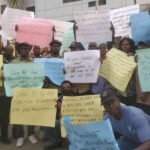President Muhammadu Buhari recently spoke on the success of his administration in eliminating Boko Haram in Nigeria’s northeast.
In a statement, the president said, ‘In the northeast, God has helped us to clear Boko Haram, the economy has picked up and some people are asking me about the achievements of my promise to fight corruption’.
One would ask if this statement is one based on fact because the present security situation in the country shows that insurgency has taken a different dimension under this government.
Northeast security
According to United Nations figures, insecurity over the past 12 years has been linked to armed groups, including the terrorist group Boko Haram, and has disrupted livelihoods and led to the displacement of some 2.2 million people.
A report by the International Civil Society Action Network (ICAN) in February 2021 revealed that suspected terrorists fired rocket-propelled grenades at several densely populated areas of the city of Maiduguri, the capital of Borno State.
In this attack, about 16 people were killed, including children playing in a playground, and nearly 60 were injured.
The report also disclosed that in early 2022, Maiduguri faced a range of attacks by the insurgents as power supply lines were blown, which plunged the city into total darkness for weeks on end, plus frequent reports of roadside abductions and beheadings.
According to ICAN, although Boko Haram is considered Nigeria’s biggest security threat, the group is not the only threat that citizens in the north face on a day-to-day basis as other insurgent groups have started operating there.
Bandit attacks have become a thing in the northwest and northeast as communities are being terrorised with vicious attacks including carjacking, highway robbery, kidnapping, rape, and murder.
According to a report by Nextier SPD titled Nigeria’s Security Situation Analysis, which was published in September 2022, in the Northeast, Boko Haram insurgents have continued to terrorise residents.
The report revealed that in 2021, there were 64 terrorist incidents and 456 deaths in the subregion.
In June 2022, the Governor of Bauchi State, Bala Mohammed, expressed concern that bandits appeared to be emboldened in their onslaught on several parts of the state.
Similarly, in May 2022, there were reports of terrorist attacks on the precincts of the six Battalion of the Nigeria Army, Jalingo, where the explosion fell the fence of the building.
In its Monthly Protection Report for February 2022, the UNHCR in Maiduguri said terrorism incidents were reported in various locations in the state.
The report also noted that criminal elements continue to cause anxiety amongst the return communities in Adamawa State, with unknown gunmen terrorising the community, plus reports of incidents of kidnapping, and ransom demands.
In Yobe State, another state in the country’s northeast, communities located on the fringes of the Alagarno Forest in Gujba local government area, continued to experience attacks from Non-State Armed Groups (NSAG).
In the northwest, the farmers-herders’ conflict has also intensified insecurity in the subregion.
In as much as it seems insurgency attacks have reduced in the northeast compared to the situation before, the insurgents have not been eliminated, instead, they have broken out into different units to carry out various forms of terrorist attacks.
The president should note that there is no victory until Nigerians in the northeast can go to sleep with both eyes closed.
Security agents should also step up their game in ensuring terrorism, banditry and kidnapping are completely halted in Nigeria.
Photo source: Femi Adesina






